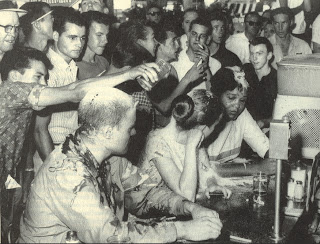

During the Civil Rights Movement, students played a vital role in helping to end segregation and racism in the south during this time. People have heard the wonderful things that the "Little Rock Nine" did down in Arkansas along with those four brave young men that sat down at the lunch counter in that North Carolina company store. However, you may not have heard about a small, private, liberal arts college in Madion County of Jackson, Mississippi. This college was founded in 1869 by the American Missionary Association to provide teacher education and industrial training for African Americans in Mississippi. Although a historically black college, from its start, Tougaloo College served all races. Tougaloo students and white students at nearby Millsaps College, a white Methodist school, formed academic and social bonds, setting, for at least the time, a rare example of racial cooperation and peace. In 1960 Tougaloo installed a president who would lead the college through the turbulent years of the civil rights movement. Dr. Adam Beittel began a successful exchange program with several northern schools, including Brown University, which brought white students to Tougaloo. Because Tougaloo College was a private institution administered by a board in New York, it was free from State control. Students at Tougaloo began protesting racial discrimination in Jackson, and led a boycott of restaurants in the city which refused to serve blacks. Many students were arrested for protesting at the businesses and for trying to attend segregated white churches and concerts. President Beittel frequently bailed the students out of jail. The students also led a successful campaign to encourage white entertainers not to participate in segregated performances in Jackson. In the 1960s Student Nonviolent Coordinating Committee members Bob Moses and James Lawson held voter registration and nonviolence workshops on campus.Resistance to the civil rights activities of the students brought violence to the Tougaloo campus, as faculty housing on the edge of the school often became the target of drive-by shootings. In 1964 the Mississippi State Sovereignty Commission (created by the legislature to defend the state from the encroachment of federal authority) successfully prevailed on Tougaloo's Board of Trustees in New York to dismiss Dr. Beittel as college president by threatening trouble between the college and the State if Beittel remained. The Board removed Dr. Beittel, but by this time the student movement on campus was waning.Tougaloo College has continually sought to enhance the education of its students, as well as to promote harmonious racial relations between whites and blacks. As the center of the civil rights movement in Mississippi, Tougaloo College played a vital role in advancing the black community in the State.
By: Kyle Brandon

